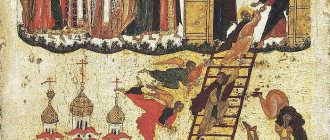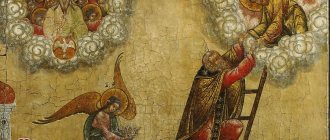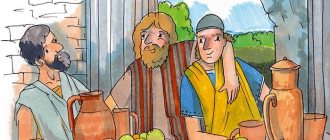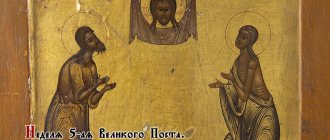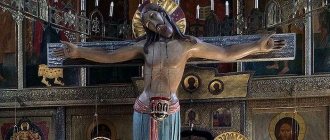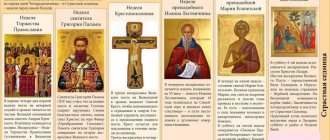Interpretation of the Gospel for every day of the year. 4th Sunday of Great Lent of St. John Climacus
Mk, 40 credits, 9, 17-31
One of the people said to Jesus: Teacher! I brought to You my son, possessed by a dumb spirit: wherever he seizes him, he throws him to the ground, and he emits foam, and grinds his teeth, and becomes numb. I told Your disciples to drive him out, but they could not. Answering him, Jesus said: O faithless generation! How long will I be with you? How long will I tolerate you? Bring him to Me. And they brought him to Him. As soon as the demoniac saw Him, the spirit shook him; he fell to the ground and lay there, emitting foam. And Jesus asked his father, “How long ago did this happen to him?” He said: since childhood; and many times the spirit threw him into both fire and water to destroy him; but, if you can, take pity on us and help us. Jesus said to him: if you can believe as much as possible, all things are possible to him who believes. And immediately the boy’s father exclaimed with tears: I believe, Lord! help my unbelief. Jesus, seeing that the people were running, rebuked the unclean spirit, saying to him: the spirit is dumb and deaf! I command you, come out of it and do not enter it again. And, screaming and shaking him violently, he went out; and he became as if dead, so that many said that he was dead. But Jesus took him by the hand and raised him up; and he stood up. And when Jesus entered the house, His disciples asked Him privately: Why could we not drive him out? And he said to them: This generation cannot come out except through prayer and fasting. Coming out from there, they passed through Galilee; and He didn't want anyone to find out. For He taught His disciples and told them that the Son of Man would be delivered into the hands of men and they would kill Him, and after He was killed He would rise again on the third day.
After the Week of the Cross is the Sunday of St. John Climacus. The post reaches its peak. Next Wednesday evening - St. Mary's Station, we will hear the entire penitential canon of St. Andrew of Crete, with which during the first four evenings we began our entry into Lent. Will the words of repentance that we hear in the Church become our own words?
The ladder of spiritual ascent is the steps from earth to heaven, beginning in faith and reaching completion in love, the eternal Kingdom of Christ. The Monk John Climacus has thirty of them, according to the number of years of the Lord, when He received baptism and went out to serve people in order to save everyone through the Cross. We must climb these steps, making every effort to ascend to such a height where we will become capable of accepting the gift of the Cross of Christ and the Resurrection. And this means that the ascent is at the same time a descent down, step by step, to the bottom of hell; the ability to “call out from the depths” with all your sorrow, life and death, and to know that Christ accepted the Cross and descended into hell in order to bring out from there all who freely and consciously turn to Him with their whole being.
The meaning of spiritual life is to bring evil into the light of God, where it perishes. Evil is hidden also because darkness provides it with unhindered growth, and the strategy and tactics of evil is to act in the darkness, delivering unforeseen blows. However, due to the blindness of people, evil is becoming more and more impudent, increasingly revealing itself in such an undisguised form, in which the story about the possessed youth in today's Gospel clearly shows it. We do not have the opportunity to perform the exploits of the ancient fathers, but the Lord, in order to save us, gives us another desert, where evil is clearly closing its ring around us. The ladder is the Cross of Christ. How to measure the depths of love without measuring the abyss of evil? Why couldn’t God reach me without Himself crossing the streams of dirt and blood that separate me from Him? This evil, scattered everywhere, intangible and dominating everything, here it is visible, tangible. Everywhere present in all time and space, it is all gathered at this hour on Calvary - by the One who created time and space and is now pierced by the spear of a Roman soldier. Will this copy not wake us up from sleep, from years of lasting lethargy, which increasingly considers as habitual, almost normal, what is unbearable for God? God is crucified by evil - how can I pretend that this evil does not concern me? God's compassion makes me penetrate into the suffering of the world, which was worth His suffering.
You say you are looking for bliss, grace. But is it possible for someone who must ascend the steps of the Beatitudes to remain invulnerable in the face of evil? You talk about works of mercy, but mercy is the truth, the most demanding, the most inexorable. What is mercy if not participation in the suffering of Christ in the face of evil? It presupposes a hatred of evil infinitely stronger than that which all our truths can inspire. It reveals that the most precious effect of the suffering we share with the Lord is the healing of those mortally affected by evil and our immersion in mercy, our own healing.
And therefore the Lord rejects any defense that is not the defense of the Lamb. He offers the agony of death on the Cross to His faithful as the full armor of truth and gives the world the blessed acceptance of the most defenseless creatures - children: “Do not prevent children from coming to me, for of such is the Kingdom of Heaven.” And when we hear in today’s Gospel the voice of a sorrowful parent that his son is going berserk, throwing himself first into fire and then into water - and this has been happening to him since childhood - we think about our children. Not about adults, but first of all about those to whom the Kingdom of Heaven should belong. Possession, which led everyone into numbness during the earthly life of Christ, has now become a common occurrence. And no one seems to be horrified anymore, everything has become so familiar.
Why do you look at the warped seats of trains and dirty elevators and entrances? Look better at the childish faces of children disfigured by television, school, home and street, and by everyone who has finally found complete freedom to corrupt our children! Children of spiritual Chernobyl: how brightly the star Wormwood sparkles! Children-murderers, children-drug addicts, children-prostitutes, children-psychics, children-speculators. And among them are millions of street children abandoned by their parents or who have run away from home. “Nobody’s children,” as the newspapers say. Children of our time, children of Russia, our children. Children who have just learned to speak, on whose lips there is foul language instead of prayer and any other speech. And how many of the unborn children, unless they are killed before birth, are already infected with the virus of madness of our earth!
We stand in mournful silence: what more can be said? But when the Lamb hears this, a cry is heard, tearing the curtain of heaven: “My God, My God, why have you forsaken me!” And our answering cry rushes to Him: “Lord Jesus Christ, Son of God, have mercy on us!” When evil triumphs, when there is too much evil, what else is left to shout? When everything overwhelms us, His name alone holds us up. “O faithless and corrupt generation! - says the Lord today, - how long will I be with you? How long will I bear with you? These are the signs of recent times - indifference and cruelty. Don’t you know that every day the Lord walks among our city, forgotten and unrecognized by anyone in the crowd of passers-by, and someone looks around and says: “What are you talking about? All this is ancient history, now it’s a completely different time.” And don’t you see Him every day, tormented and beaten, slashed with a whip and spat on, and a huge, invisible Cross with His name embossed on top rises above us more and more clearly, because the end is approaching. Where violence reigns, how to hold back these tears, which, like the name “Lord Jesus Christ,” flow from someone’s heart without ceasing!
Oh, if only the whole Church had such mercy for the world! But how often do we find ourselves like the disciples of Christ to whom his father brought the possessed boy - completely unable to help. And this failure of ours, which stems not only from the unbelief of those who come to Christ, gives the opportunity to the enemies of the Church to humiliate the Church and the Lord Himself. Too often we find ourselves in this position, especially in these times when national distress is increasing. Russia turned out to be a house, cleanly swept and tidied, and unoccupied by anyone, and the expelled unclean spirit, the spirit of communism, brought with it seven evil others. It’s as if we got the opportunity to preach, and we say to people who don’t know God: “Look at the Church! This is the Body of Christ, His Bride, without spot or wrinkle, or any such thing,” and other lofty, true words. But only by our actions, by our ability to respond to the demands of life, do people judge the Church and judge Christ.
The sick youth is possessed by a dumb spirit. His father is desperate. He was faced with the powerlessness of his students. And he is not entirely confident in the strength of their Teacher. “If you can, have compassion and help us,” he says to Christ, half believing and half doubting. But by admitting his weakness and calling for help, he already acts as a disciple of Christ. And the disciples closest to the Lord were defeated because they relied only on their own strength. But they received power over unclean spirits! Obviously, the demon of muteness is stronger than others. The boasting of a chatty demon can be countered by the power of words. But if the devil is silent, only the silence of our heartfelt prayer, when we are truly with God, can be an effective weapon. The demon is dumb and at the same time the demon is deaf. Satan is never so cunning and dangerous as in this shelter of impenetrable deafness, when it seems that he is not here.
All this is happening now - not only in the sense of what is happening in the world. This is about the weakness of our faith. The Lord also calls us slow and sluggish in heart. We, too, sometimes suffer, like this youth, from deafness, because we are struck by the disease of sin and painfully seek deliverance from it. And often we don’t hear because we don’t want to listen. And the Lord says that the weakness of our faith is connected with the weakening of our prayer. “All things are possible to him who believes”—by the almighty power of God. In our relationship with Christ, much depends on our faith, and much is promised to faith. “Do you believe this?” “If you can believe as much as possible,” your hardened heart will soften, and your spiritual illnesses will be healed. And no matter how weak you are, you can stand to the end. “I believe,” says the unhappy father. “Let the weakness of my faith not become an obstacle to the healing of my boy.” And he adds a prayer for help in order to trust more firmly in the salvation of Christ: “Help my unbelief.” Anyone who complains about unbelief must turn to Christ so that He can help him. And His grace will be sufficient. “Help me overcome my unbelief, give me by Your grace what my faith lacks—strength made perfect in weakness.”
The Lord calls you to faith. In His Divine Person evil is defeated. The healing of the boy occurs when his torment reaches its limit. “Crying out and shaking him violently, the demon came out.” “And the boy became as if dead, so that many said that he was dead. But Jesus took him by the hand and raised him up; and he stood up." This “rose” - “rose up” - in the language of the Gospel means resurrection. The Risen Christ will raise the dead, and now He is demonstrating His Divine power. He is the Conqueror of evil and death, and we are called to place all our trust in Him with faith.
“This kind cannot come out except through prayer and fasting.” Why? Because faith is a living connection with God. She is the silence of listening, the silence of attention. My whole life is directed towards Him. Faith is simple, it should not contain any impurities, it is pure. On the contrary, the dumb and deaf spirit that the Gospel proclaims is unclean. He doesn't speak, he just makes noise. He is always unclean, this noise he makes in our heart. And only through prayer everything becomes pure. Prayer is not simply standing before the face of God, as if we were external to Him. In prayer, which is pure faith, I am in Him and He is in me. I don't need to look for Him outside. It's very simple: when I accept Him, He finds me, and I find Him.
As St. John Climacus says: “Give prayer to the one who prays.” If we ask the Holy Spirit from the Father according to the commandment of Christ, then everything will be given to us, including the gift of prayer. This opportunity to believe is offered to us and we must accept it. To be born of the Father and turn to Him: “Our Father,” surrendering oneself to Him. This is the simplicity and purity of faith. The Holy Spirit will teach us to pray unceasingly, because we live unceasingly - to the extent that we pray in Him.
When we pray, when we repent and partake of the Holy Mysteries of Christ, the Lord gives us strength, allows us to taste and see how good the Lord is. But we cannot keep this gift; we will lose it if we accept it only for ourselves, only to console our hearts with heavenly sweetness, forgetting about the suffering of others. Only by fasting and prayer can we preserve Divine power within ourselves and resist all evil. By fasting - abstinence in the midst of the corruption that prevails in the world through lust and prayer - the constant unity of our spirit with God.
“The Son of Man will be delivered into the hands of sinners, and they will kill Him, and on the third day he will rise again” - the Lord reminds us of the essence of everything that is happening. Satan summons his servants for the final battle. Church time is a time of fasting and prayer. The time of the Cross and Resurrection is approaching.
Gospel to the Reverend: Matthew, 10. (4, 25 – 5, 12)
Don't look, don't tell, don't care
As a basis, I offer a passage from the gospel where the disciples ask Jesus why they could not cast out a demon from a boy. And Jesus says - BY UNBELIEF. Let's look at the places where this particular word is used.
We see that the same Greek word is translated two different ways - unbelief and lack of faith. But we see that in all these situations, Jesus pays attention to how people look at the circumstances. The disciples, for example, not only believed Jesus, they performed miracles, saw miracles. However, when incomprehensible circumstances appeared, they developed DISBELIEF. They SAW that the boy was not healed the first or second time. Peter even walked on water. Great faith. However, he looked at the storm, and immediately fell and LOST the ability to walk.
Blessed are those who have not seen
Then Jesus said something that was meant not only for Thomas, but for all of us: “Because you have seen Me, you have believed; Blessed are those who have not seen and yet have believed” (John 20:29).
Thomas was chosen by Jesus as the unique authoritative witness to His resurrection (Acts 1:22); that is why he received the gift of seeing Jesus with his own physical eyes.
But Jesus' rebuke is understandable. There were others who still had not seen Jesus, but still believed in His resurrection. And their faith was more blessed than Thomas' vision. Why? Because these saints relied on the eyes of faith more than on the eyes on their heads - and seeing by faith, in this age, brings more joy than seeing with the eyes.
This is why Peter, Thomas’s colleague and fellow witness, later wrote:
“Whom, though you have not seen, you love, and whom, although you have not yet seen, but believe in Him, you rejoice with inexpressible and glorious joy, finally achieving through your faith the salvation of souls” (1 Peter 1:8-9)
From doubt to delight
According to the apostle John, Thomas was not present on the evening of Easter Sunday when Jesus appeared to the other disciples and dedicated followers (John 20:24). And no matter what they said, Thomas refused to believe that Jesus had risen until he saw Him with his own eyes (John 20:25)—and thereby earned his posterity the unflattering nickname “Doubting Thomas.”
The Holy Spirit did not prompt John to record this moment in order to embarrass Thomas. Rather, this entry is there because God has something important to teach us about our own doubts and what kind of “seeing” actually brings joy.
Doubt about God
Let's look at another word and another meaning.
The second type of unbelief is manifested in the fact that people do not trust God. They doubt His abilities, desires, promises. And this guy is much scarier. If in the first case we simply cannot do something, then disbelief in God and His Word leads to disastrous consequences. Paul also rejected the Word, although in ignorance.
It turns out that there are two types of unbelief.
1) this is when we look at the circumstances
2) when we don't trust God and His Word
